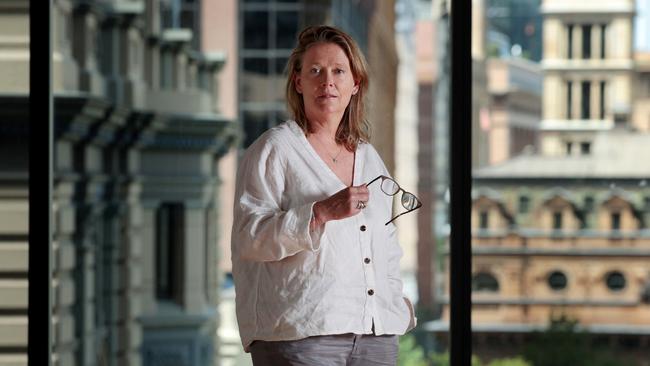Businesses urged to double down in the face of ‘climate weirding’
Business, government and the public must accelerate the speed of energy transition in this age of ‘climate weirding’, says sustainable development expert Dame Jo Da Silva.

Business
Don't miss out on the headlines from Business. Followed categories will be added to My News.
When Dame Jo Da Silva left her London home on Sunday to fly to Sydney, it was a “sweltering” 25C.
“On the 8th of October. I took my dog for a walk, in a T-shirt, on the 8th of October!” she says.
The engineer and global lead for sustainable development at the big design and consultancy firm Arup is not scared by temperatures almost 10C above average, but she knows it’s extreme.
“I think the new phrase is climate weirding, that’s what people are talking about,” she says.
“Am I frightened? No, because I knew this was going to happen 20-something years ago.
“But the thing that is very disconcerting is the speed of change in our climate and the fact that these events are happening everywhere.
“It felt at one point last year that the whole of the world was on fire. Temperatures of 50 degrees are not temperatures that we, as human beings, have been designed to withstand.”
Dame Jo says the pace at which business, government and the public are being asked to adapt is changing. It’s now about “doubling down hugely on mitigation efforts and massively accelerating the speed at which we transition our energy systems, the speed at which we shift to different forms of transport”.
She references the Titanic: “Do you want to continue dancing in the ballroom as if nothing’s happening, or do you get out there and man the life rafts? It’s quite clear to me that there’s only one option.”
The good news is that the pace of change in areas such as construction of wind turbines or the price of photovoltaics is “extraordinary”, even with push back from some sections. Nimbyism – people objecting to renewable infrastructure or high-speed trains in their regions – is a challenge for governments and companies “but the point about the investment that’s needed now is that we’re all in it together”.
She says the US Inflation Reduction Act is a good example of government taking an “informed, long-term view knowing that spending money now creates jobs, enables people to eat and put a roof over their head, to pay the rent. It’s created huge numbers of jobs. At the same time it is future-proofing the country.
“There is a mind shift that we have to embrace – we have to do what is necessary to curb climate change and reverse nature loss. Unless we do those two things the costs in the future, not just economically, but cost in terms of human life and loss of assets and damage to infrastructure assets, is going to be orders of magnitude bigger.”
Dame Jo blames poor communication from scientists in part for delays in climate action and contrasts the way people “have warmed to the nature crisis”.
“People feel a connection with nature,” she says. “They can remember the birds singing more when they were kids. There’s 70 per cent loss of species since I was born, and that’s something that feel – there were more animals and bugs around.”
Dame Jo says climate activism has a big role to play as long as it does not involve violence.
“Activists speaking up, saying what needs to be done,” she says. “But that happened far too late. Greta Thunberg was really the one who gave climate a voice, she spoke about it in layman’s language, her famous ‘the world is on fire’ really galvanised (people).
“I think the problem at the moment is a lot of people are scared, and they don’t know what to do. It’s about the uncertainty of the future.”
She says Arup made a conscious choice a few years ago to put sustainable development at the centre of its work and decided in 2021 that it would not take any more commissions involving hydrocarbons. “Next year, 90 per cent of our projects (will be) renewables,” she says.
She has done extensive work on “resilient cities” including in the developing world, and says we are now beginning to see the long-term impact of Covid-19 on our cities as people realise their dependency on local services.
“So the notion of the 15-minute city (the idea all services are within a 15-minute walk or bike ride), which was conceived in around 2016, became very real for many people,” she says.
London may be hot this month but Dame Jo says it is one of the greatest cities in the world – culturally rich and “truly and deeply inclusive”. “The other thing about London that makes it very special, which is true of all my favourite cities, including Sydney, is that nature is very prevalent in London,” she says, noting its many parks and green space.
Originally published as Businesses urged to double down in the face of ‘climate weirding’



